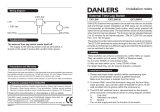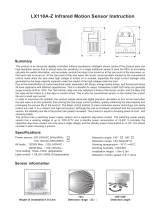Page is loading ...

Installation notes
DANLERS Limited, Vincients Road, CHIPPENHAM, Wiltshire, SN14 6NQ, UK.
Telephone: +44 (0)1249 443377 Fax: +44 (0)1249 443388
E-mail: [email protected] Web: www.danlers.co.uk
Company Registered Number 2570169 VAT Registration Number 543 5491 38
Products available from DANLERS
• PIR occupancy switches • Daylight linked dimmers • Manual high frequency dimmers
• Photocells • Radio remote controls • Time lag switches • Outdoor security switches
• Dimmers • Heating, ventilation and air-conditioning controls • Bespoke / O.E.M. products
Please call for more information or a free catalogue, or visit our website.
This product conforms to BS EN 60669-2-1. Product complies to Class 2 insulation.
Please ensure the most recent edition of the appropriate local wiring regulations are observed
and suitable protection is provided e.g. 6 amps over current, 1kV over voltage. Please ensure
that this device is disconnected from the supply if an insulation test is made.
This product is covered by a warranty which extends to 5 years from the date of manufacture.
Precautions and Warranty
DANLERS High bay passive infra-red occupancy (presence detection) switches
with closed loop control can be used to control high frequency 10VDC dimmable
ballasts. They each incorporate a passive infra-red quad sensor to detect movement
of a warm body within their detection zone (diagram A) and a photocell to monitor
the ambient light level.
Each of the controls can be mounted directly onto solid ceilings or onto a range of
different mounting boxes.
The high bay controls are available in three types - each with a particular detection
pattern which is optimised for particular applications.
HB PIR ND 10VDC: Narrow Detection version is ideal for covering storage aisles.
HB PIR SP 10VDC: Spot Detection version is ideal for smaller areas, such as the
entrances to storage aisles.
HB PIR WD 10VDC: Wide Detection version is ideal for large open areas, such as
factories, sports halls and entrance halls.
Functions
Upon detecting movement, they will switch the articial lights ON to maximum
value and start the closed loop control to maintain the preset lux level value (LUX)
between 30 and 1000 lux (default value 1000 lux). See diagram C.
NO BACKGROUND ILLUMINANCE RUN ON TIME SET:
If no further movement is detected the lights will switch OFF after the set PIR hold
timer (TIME) has expired. This time lag can be set via the TIME adjuster to 10
seconds, 20s, 40s, 80s, 2m30s, 5m, 10m, 20m or 40 minutes (default value 10
seconds). See diagram B.
BACKGROUND ILLUMINANCE RUN ON TIME SET:
If no further movement is detected the lights will FADE to minimum after the set PIR
hold timer (TIME) has expired and stay at minimum until the background hold timer
(RUN ON) has expired. The RUN ON time can be set via the RUN ON adjuster to 0,
1, 2, 5, 10, 15, 20, 30 minutes or innite (default value is 0). See diagram C. If the
PIR sensor is triggered while the background hold timer is counting down, the lights
will switch ON at maximum and start the closed loop control to maintain the set lux
level value.
Loading
They can dim up to 20 x 1-10V dimmable ballasts, assuming each ballast has a
constant current output of 1mA.
These PIR switches can also switch up to:
6 amps (1500W) of dimmable uorescent lamps.
2 amps (500W) of CFL, LED Drivers and LED lamps and ttings.
Minimum load 2W.
High bay PIR occupancy switches with 1-10VDC dimming
HB PIR ND 10VDC HB PIR SP 10VDC HB PIR WD 10VDC
Variants
Absence detection variants:
Each of these High bay PIR occupancy switches with 1-10VDC dimming are also
available with absence detection (requires a momentary (retractive wall switch).
Troubleshooting
The load will not switch on:
• The moving body is not emitting more IR than the background.
(Person wearing insulating clothing in a warm environment)
• Person is too far from the PIR switch, see detection diagram.
• Person is moving unusually slowly (perhaps when testing).
23/08/16 INS272 HB PIR (xx) 10VDC

Up to 5m
diameter
Up to 3m
NARROW
DETECTION (ND)
Mounting height
up to 12m
Perspective view -
ceiling mounted
Up
to
15m
SPOT
DETECTION (SP)
Mounting height
up to 20m
Perspective view -
ceiling mounted
Up to 28m
diameter
WIDE
DETECTION (WD)
Mounting height
up to 14m
Perspective view -
ceiling mounted
Installation procedure
1. Please read these notes carefully before commencing work.
In case of doubt please consult a qualied electrician.
2. POSITIONING: These high bay controls should be installed to achieve correct
coverage of the area, see diagram A for the appropriate detection pattern.
Avoid
locating this product where it is exposed to drafty conditions (exposed lobbies,
open ceiling voids or near fans) or near heat sources.
3. Make sure the power is isolated from the circuit.
The PIR should be connected as shown in diagram D:
SL Switched Line out
L Live in
N Neutral in
DA - - control line (Polarity dependant)
DA + + control line (Polarity dependant)
SW1 Not used
4. Knockout or drill the appropriate holes on the mounting plate for attaching the plate
to the ceiling or back box (if applicable). Feed cables through the appropriate (side
or rear) entry hole (see diagram E). Screw the back mounting plate to the ceiling
or back box via the mounting holes. Wire the cables into the sensor head block
terminal. Push the sensor head onto the mounting plate and align the side clips
with the slots on the sensor heads.
Start-up mode
When the PIR is powered up, it will switch on the load for 1 minute, the load will
then switch off and the PIR will enter its Operating Mode.
Time / Run-on / lux set up
The LUX adjuster spindle on the side of the PIR is used to regulate the automatic
daylight linked dimming function lux level (see diagram C opposite). This should be
adjusted in situ by rotating the LUX adjuster slowly anticlockwise (+ to -) so that the
desired level of brightness is achieved under the luminarie(s) being controlled.
Once the correct level is achieved and there has been no further adjustment to the
LUX spindle,
the control
will go through a 30 second delay before the automatic
closed loop control will start.
These controls incorporate a xed 90 second fade rate from maximum to the set
back level.
Sensitivity
These controls incorporate a sensitivity adjuster, labelled ‘SENS’, to reduce the
range of detection from 100% to 50% in 9 steps
(see diagram B opposite).
D: Wiring diagram, HB PIR (xx) 10VDC controlling several 10VDC dimmable ballasts
RUN ON
minmax
LUX
minmax
Typical settings
INFINITE
30m
20m
15m
10m
5m
0s
1m
2m
C: Adjusting LUX & RUN-ON
TIME
minmax
SENS
minmax
Typical settings
40m
20m
10m
5m
2.5m
80s
10s
20s
40s
50%
100%
B: Adjusting SENSITIVITY & TIME
A: Detection diagrams
Knock out mounting
holes or pre-drill
pilot holes.
For cable entry
from above -
knock out central
mounting hole
For side entry -
knock out side
mounting hole
from mounting
plate and device
Connect wires to
terminal block on
the device
Join device to
mounting plate via
mounting clips
E: Mounting plate xing
L
N
Ballast
1 10
Control Lines
Optional
other load
230 VAC
SL
L
N
Ballast
1 10
SL
DANLERS
1-10VDC
High bay control
(Presence)
/










